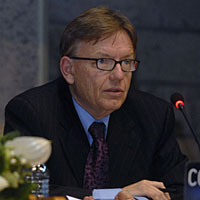Copenhagen: Negotiators Seek Balanced Agreement
In Copenhagen negotiators from 192 nations are taking efforts to hammer out a limate change treaty that balances the economic concerns of developed nations with the demands of developing countries . The latter say they would suffer most from a warmer planet.
 Photo: Copenhagen: Negotiators Seek Balanced Agreement
Photo: Copenhagen: Negotiators Seek Balanced AgreementOne NGO says putting more money on the table could mean the difference between success and failure at the climate change conference in Copenhagen.
Hugh Cole, a climate change advisor for Oxfam International, says there are three key components for a strong and fair climate change deal in Copenhagen.
"First, it has to be fair. That means it has to acknowledge historical responsibility. The second is it must be ambitious. It has to be ambitious enough to limit global warming. The third key element—whatever is agreed upon here in Copenhagen must be binding," he says , Voice of America reports.
It was also reported, a document prepared by one of the summit's chairmen calls on developed nations to cut greenhouse gas emissions by 25-45% from 1990 levels by 2020.
Analyses suggest that current pledges add up to about 18%.
The document leaves open the exact target for limiting temperature rise, amid disputes between various blocs.
Small island states and poorer nations of Africa and Latin America have called for the document to endorse the target of keeping the temperature rise since pre-industrial times below 1.5C (2.7F).
This is below the figure of 2C (3.6F), which was endorsed by the G8 and major developing economies in July, and implies the need for drastic emission cuts.
Both figures are listed as alternatives in the draft document , BBC News report.
Meanwhile, Yvo de Boer, who is running the talks as the U.N. Framework Convention on Climate Change's executive secretary, said the document should be seen as "a framework to address the big-ticket issues" rather than one that would provide the final answers.
He also welcomed the European Union's announcement Friday that it would provide $7.2 billion euros in short-term financing to developing countries.
The move "will, I think, be a huge encouragement to the process," De Boer said. "We will then have to see what other rich countries put on the table to match that sum, " The Washington Post reports.
Subscribe to Pravda.Ru Telegram channel, Facebook, RSS!


